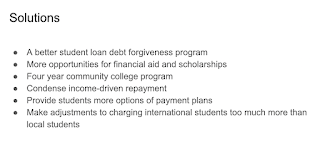But for those paying attention, there were whiffs. The thing I have in mind right now starts with the problem of the spiraling cost of higher ed in the the US, and the concomitant crisis of student debt. One of the student groups was tasked with thinking of responses, and they came up with a few.
One of the students had listened to a podcast we assigned the week before on the significance of Biden's debt forgiveness program. But none considered, perhaps because they got together to plan their presentation before or instead of reading it, one of our assigned texts for the final class, a related essay entitled "The return of college as a common good" from The Chronicle of Higher Education. (It's behind a paywall; I can send you a pdf if you're interested.) Why should not society pay for higher education?
This essay narrates how recently college has come to be thought of as a private investment of individuals (and their families), valuable even if it involves debt, and suggests that the tide may be turning again. But it only scratches the surface of what it might involve to think of college as a "common good" - the thinking behind not just the land grant and other state universities steadily defunded in our time, but the whole earlier history of universities we learned about in our first session, which told how political rulers and cities and churches and states and empires established - and funded - universities. But perhaps it didn't come to our students because they understand their own college careers in such privatized ways. "Public" or "common goods" are hard to even conceive in a neoliberal world.
To get students to appreciate what thinking of higher education as a common good might entail, one could use another of the texts we assigned for our last class, a description of the convening of Te Wānanga o Raukawa, an institution of "higher level Maori learning" in Aotearoa New Zealand. The university isn't the first or last part of a broad and longstanding effort to revive and sustain traditional Maori ways. An undated paper entitled "Leaders Are Made Not Just Born" explains how as part of imagining a thriving Maori community, they decided they needed people educated for various specialized roles:
The New School offers degrees in only two of these. For what projects are the things we teach a common good - if indeed they are? And should society invest in all the many majors offered in American universities? Business? Philosophy? Product design? Classics? Sports management? Literature? Dance? Communications? Computer game design? Anthropology? A few additional steps are required to make the argument that society should subsidize whatever students choose to major in, from advertising to zoology, and it would be valuable to tease them out. (There might be several ways to make the case.)
Maybe this will come up when we explore the world of self-designed liberal arts degrees, all of which have high-minded rationales...


